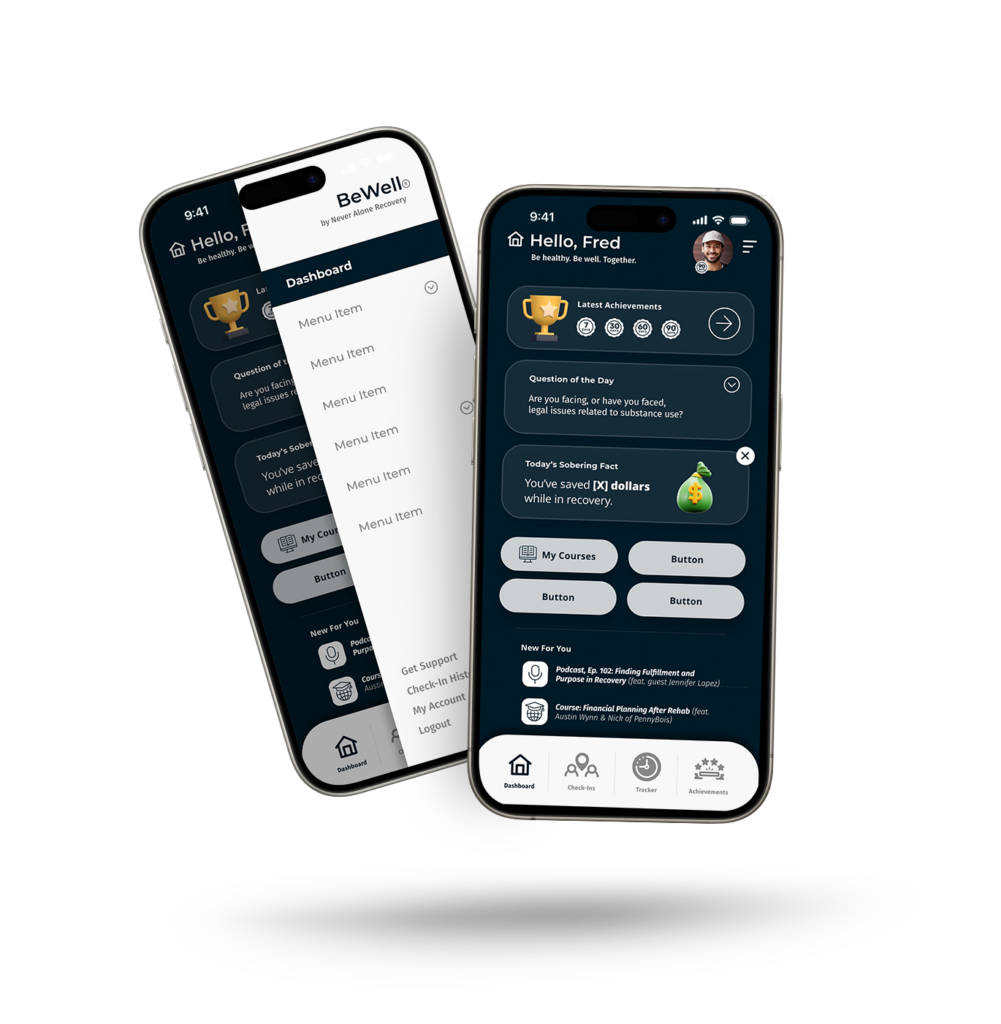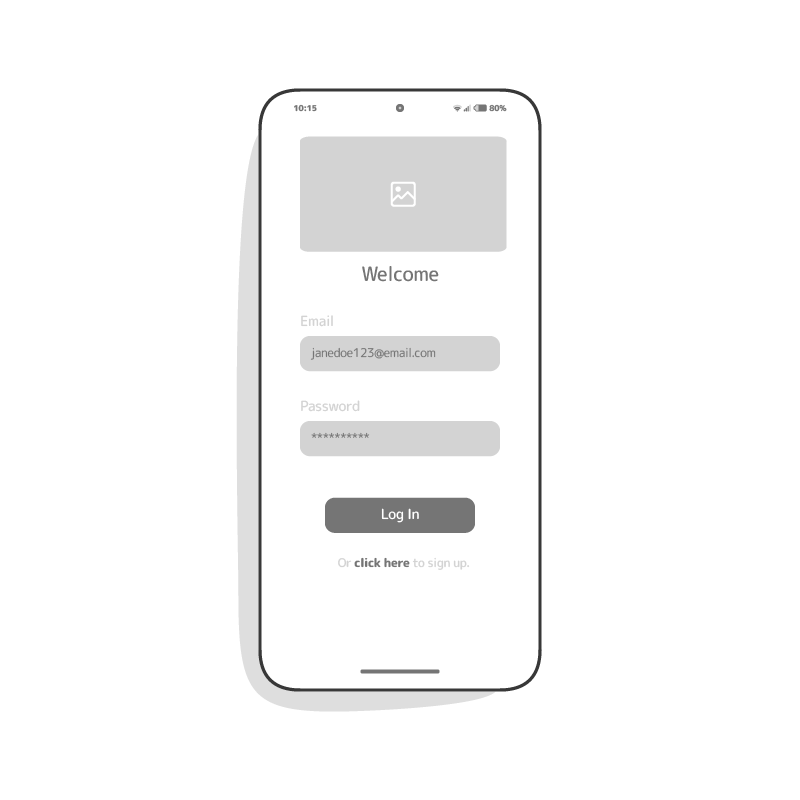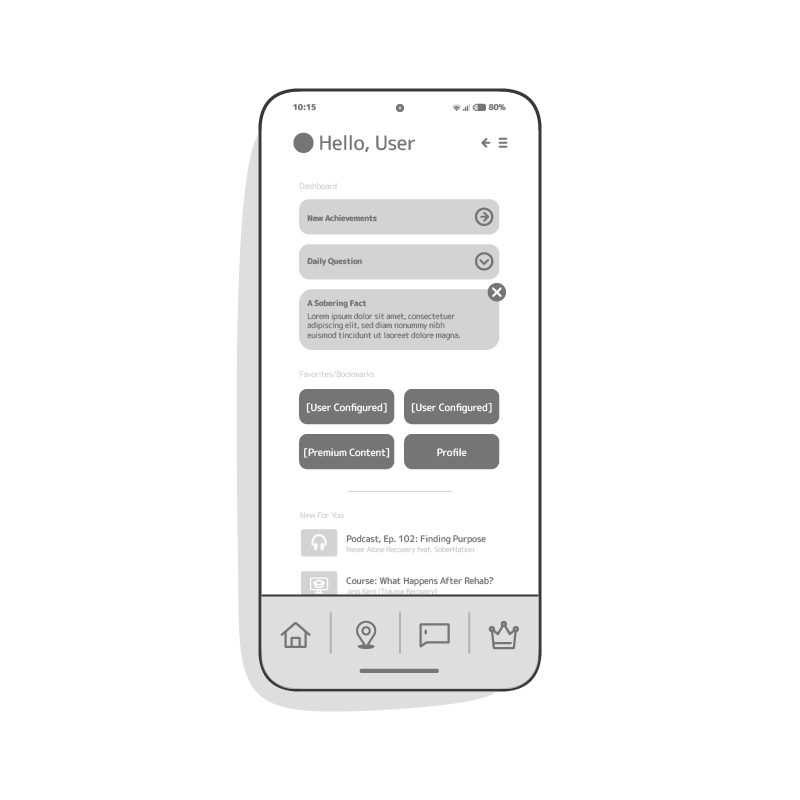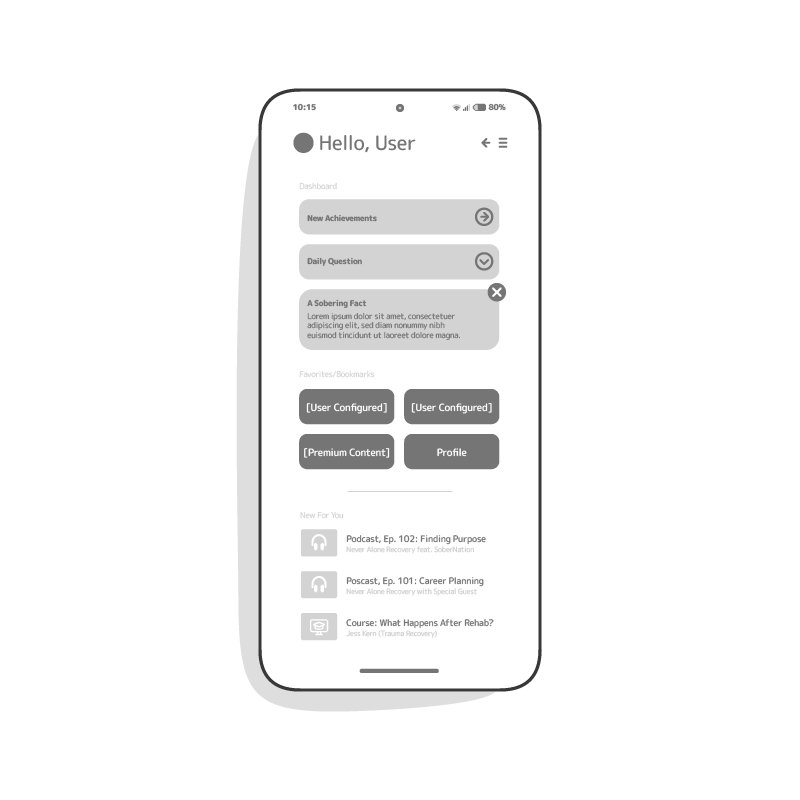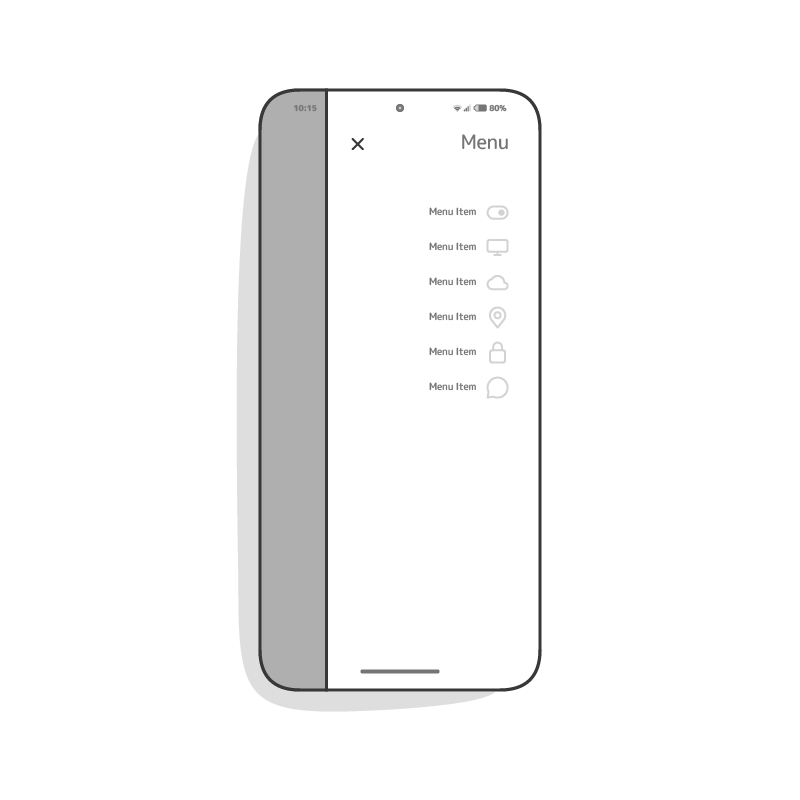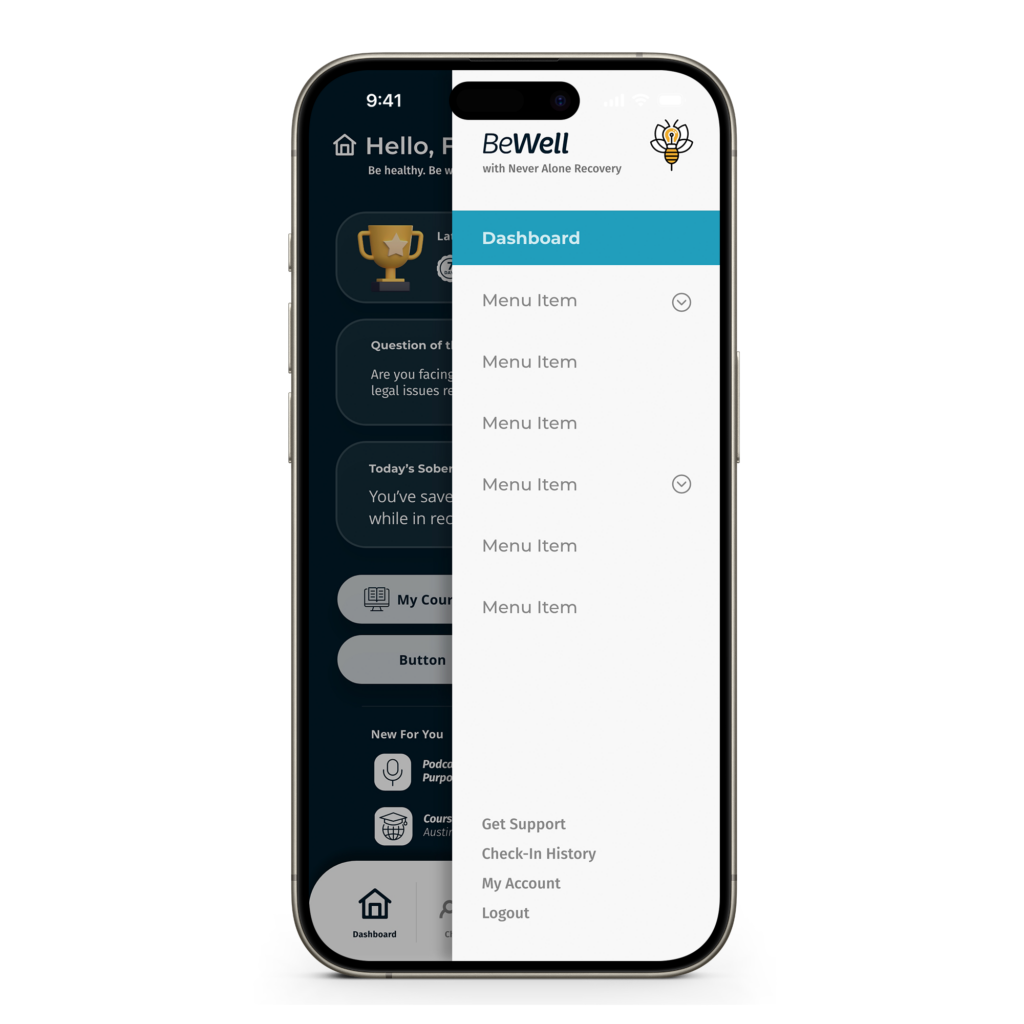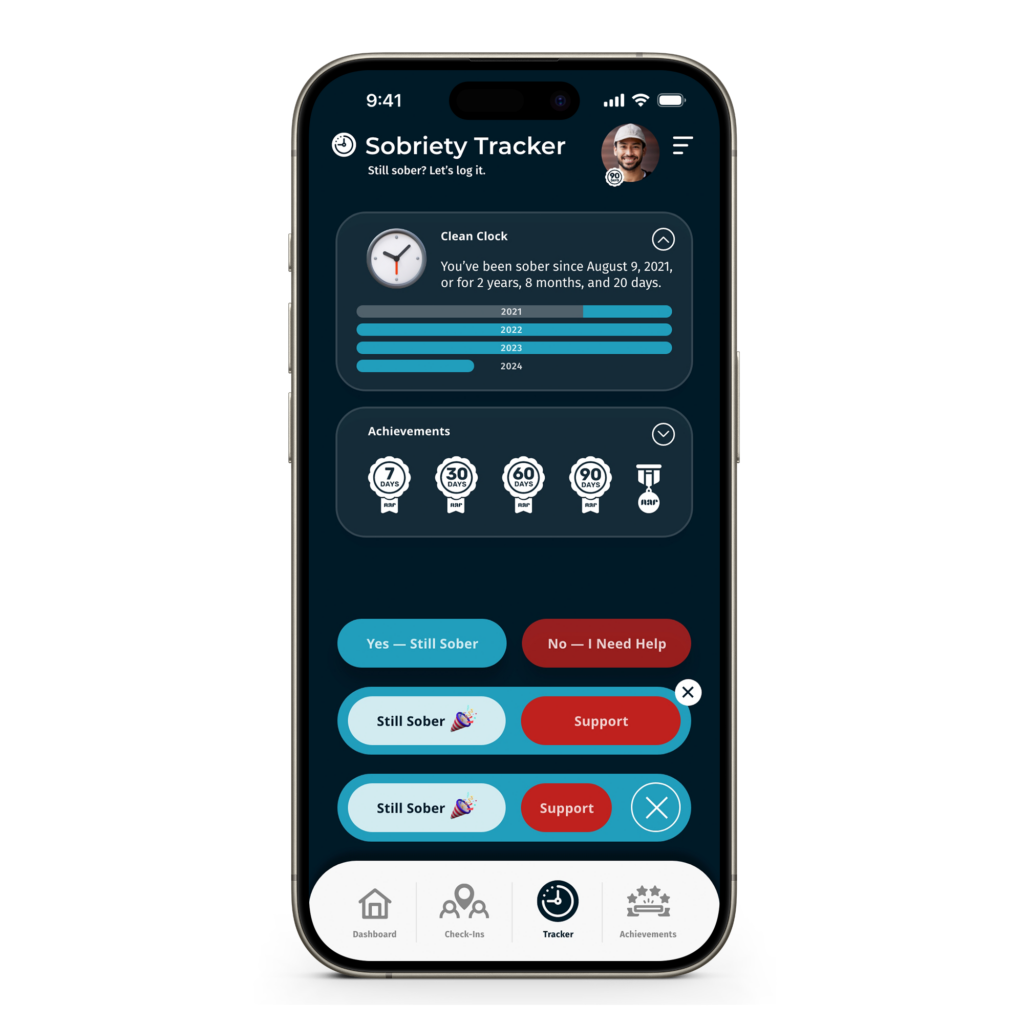Never Alone Recovery Mobile App and Accountability System
Never Alone Recovery had a vision for a mobile app that would serve as a digital companion for those in recovery. The app would provide tools to enhance accountability and support, including the sobriety tracker feature that tracks milestones with personalized affirmations and insights (e.g. ’90 days clean—you’ve saved X on alcohol’). Additional features included a support group finder.
Check out the app in soft launch now:
Multifunctional Support App with Progress Tracking & Location-Based Meeting Finder
Lead Designer
Mental Health
12 Weeks
Challenges
Engaging a vulnerable population
Designing for individuals in recovery meant addressing the unique needs of a vulnerable audience, including those experiencing high levels of stress, emotional instability, or a lack of trust in technology.
Onboarding completing for feature activation
Designing an onboarding process that encouraged users to supply key data, such as their sobriety date, necessary to activate personalized, data-driven features like the sobriety tracker. Many users may have been hesitant to share personal information or felt overwhelmed by the process.
Balancing functionality and accessibility
- Defining how new sobriety tracking features will look and function, ensuring they align with user needs and expectations.
- Concentrating user touchpoints where users can log their progress and earn points so that users can engage without this functionality becoming annoying.
- Developing an underlying points/credit system that contextualizes sobriety milestones and helps maintain user motivation.
Encouraging long-term engagement
Sustaining user engagement over time for an audience prone to fluctuating motivation levels.
Building an accountability framework
Designing a system that encouraged accountability and offered meaningful feedback without feeling punitive or intrusive. A key component of this framework involved location-based functionality to verify users’ attendance at local support group meetings. For instance, tracking that a user has been present for a minimum duration (e.g., X minutes), translating this into visual metrics representing the strength of their recovery—and, conversely, indicating potential risk factor for relapse.
Target Audience
The primary audience for the Never Alone Recovery app included men and women under the age of 55, a demographic more likely to be tech-savvy and comfortable with digital solutions.
These are individuals who own and are very comfortable using smartphones, making them more receptive to the idea of a new digital companion to support their recovery journey.
In addition, we prioritized individuals who valued personalization, real-time support, and the convenience of technology in creating structure and accountability in their lives.
Development + Design
Onboarding Process for New Users
The ability of the app to track sobriety milestones hinges on the user providing certain details, such as the date they became sober. To minimize friction during onboarding, we designed the onboarding flow to be conversational, asking for critical information at key moments.
To ensure users didn’t feel restricted, we also explored ways to let them experience key parts of the app even if they chose to skip certain steps during onboarding. For example, users could access general features or receive reminders to complete their profile later, allowing them to familiarize themselves with the app before fully committing.
A progressive onboarding approach allowed users to ease into the experience while still capturing the essential information required for more personalized functionality.
Accountability Framework
To create an accountability system, we started by looking at some of the top-used apps with features tied to tracking user data.
Duolingo
Uses streaks and badges to encourage consistent usage. We added similar streak rewards and achievement badges into the app to provide motivation to maintain progress.
Fitbit
Features goal-setting and progress-tracking mechanisms so users can set personalized fitness goals and visually track their progress. This inspired a system for the NAR app so users could set sobriety goals and milestones to visualize their achievements and keep them focused on their goals.
Waze
Has real-time feedback mechanisms based on user data. This was an unexpected reference for how we approached app notifications and updates. The main difficulty was balancing gentle nudges with real-time updates so that users stay engaged (and accountable) without feeling overwhelmed.
Tracking Sobriety Achievements
The sobriety tracker was designed as a personalized, data-driven tool to support users in their recovery journey. By using user-provided data, such as sobriety start dates, it calculated milestones, tracked days sober, and displayed financial savings, accompanied by motivational messages like, “Congrats on 90 days sober! You’ve saved about $X in that time 👏🏼.”
Dynamic visualizations and gamified elements, such as milestone badges and streak tracking, encouraged ongoing engagement while emphasizing celebration over judgment. User feedback shaped the tracker’s intuitive design, ensuring it was both empowering and adaptable to individual recovery needs, making it a central feature of the app.
Graphical User Interface
Visual Language
- Neutral colors paired with dark navy evoke professionalism, experience, and reassurance.
- Soothing rounded shapes instead of harsh corners and jagged lines.
- Minimal material design with a splash of glassmorphism to create a modern, sleek look.
Navigational Elements
- Application Dashboard: Featuring a persistent bottom navigation bar for easy access to core functionalities, this bottom dock remains fixed, overlaying all content within the app to ensure constant accessibility for the user.
- Slide-Out Navigation Drawer: A secondary menu accessible through a top-right icon, designed to overlay the main content and bottom dock, highlighting its importance when engaged.
Typography
- By the client’s request, Montserrat was the chosen as the display font for headings as well as most UI elements.
- Selected Fira Sans for body text.
Wireframing
Wireframes and mockups were created to visualize the app’s structure and flow. Interactive prototypes were developed to test and refine the user experience.
Key Features & Functionality
The app is designed as an on-demand source of innovative tools capable of supporting individuals as they transition from addiction or mental health challenges to sustainable health and well-being.
Given that relapse/recidivism is often a result of insufficient support, the app could help individuals to persevere through those difficult times. Or as things turn around, their progress can be incentivized through gamification elements.
These features ensure that users have the resources and motivation they need to achieve and maintain their recovery goals.
More Than Sober
Designed to support users seeking a fresh start, the app features intuitive and accessible tools for tracking and rewarding progress, and providing on-demand support in times of crisis.
Sobriety Tracker
A pivotal feature conceptualized as an accountability tool with personalized overviews of users’ recovery journeys. A card-based dashboard layout provides dynamically-calculated figures like total days sober, money saved, and health improvements.
Users can then share their milestones on social media, turning raw data into motivational achievements.
Gamifying Wellness
Incorporating elements of gamification to encourage not only continued use and engagement with the app but should also decrease risk of relapse.
Rewards and incentives are provided for reaching milestones, fostering a sense of accomplishment and motivation.
More Updates to Come
The app I designed for Never Alone Recovery will provide comprehensive support for individuals on their recovery journeys. Through careful planning, design, and development, the app will provide users with an intuitive, user-friendly experience with features that empowers them to track their progress and stay motivated.
This case study, though still a work-in-progress, breaks down some of my process and dedication involved in creating a tool that aims to make a meaningful impact on mental health and recovery.
See More Projects
- BrandingNew-and-improved branding for a local…
- Web DesignDesigned and developed a website…
- Social MediaDesigned all visual elements for…
- Editorial DesignDesigned a 10-page ebook containing…

